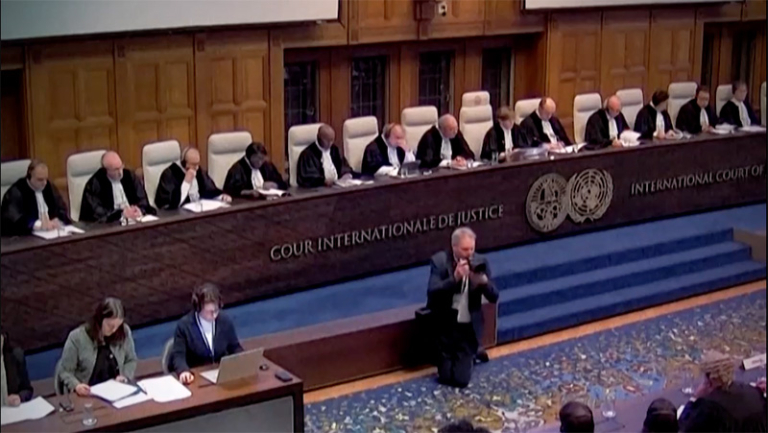
On February 19, the International Court of Justice (ICJ) began public hearings on the issue referred to it by the General Assembly of the United Nations, by virtue of the General Assembly Resolution 77/247 of December 30, 2022, regarding the “Legal Consequences Arising from the Policies and Practices of Israel in the Occupied Palestinian Territory, Including East Jerusalem.” This is a separate and distinct case from that brought by South Africa at the end of 2023 against the State of Israel under the Genocide Convention, which is still pending. In that case, the court issued a number of provisional orders (like preliminary injunctions) to Israel regarding its conduct of the war on Gaza. On February 26, Israel submitted a report to the ICJ about its compliance with the court’s provisional orders.
The ICJ case on the Israeli occupation is also different from other cases being currently investigated by the International Criminal Court (ICC). Much discussion has taken place regarding the jurisdiction of that court over war crimes and crimes against humanity. One of the bases of jurisdiction of the ICC is “apartheid,” and individual Israeli commanders and politicians can be brought before that court. As a criminal court, its subjects are not states but individuals, and its decisions can be enforced by any member state acting under universal jurisdiction.
On the basis of the 77/247 Resolution, the United Nations General Assembly brought the current case on occupation to the ICJ, which is authorized to give nonbinding advisory opinions on requests by the organization and its Security Council. Israel and its international supporters had denounced that resolution at the time of its issuance in December 2022, and Israel announced that it would not participate in the hearings or even send a delegation. Between February 19 and February 26, 52 countries presented their opinions on this issue.
The vast majority of the states that made an oral presentation expressed their opinions that the occupation itself was illegal and urged the ICJ court to declare it as such. On the other hand, the United States spoke in opposition, expressing its opinion that the court should take into consideration the security problems of Israel and refrain from ordering an end to the occupation. Hungary urged the court to refrain from giving any opinion, declaring that the very involvement of the ICJ was problematic and that it lacked jurisdiction to offer any opinion on the question, which should be left to international negotiations rather than court adjudication.
The status of the occupied territories under international law has been clear under a consensus of juridical authorities for many years. Israel is a “belligerent occupier,” and the provisions of the Geneva Convention regarding its behavior in these territories are applicable. The Israeli High Court itself agrees with this opinion, and its decisions make clear that (except for the territories annexed, such as East Jerusalem and the Golan Heights), belligerent occupation continues to be the official status of these territories even under Israeli law. Israel has tried to evade some of the consequences of this designation, by arguing sometimes that conventional international law, like the Hague Convention, but not treaty law, like the Geneva Conventions, apply. Other times, Israel or its apologists have argued that the territories are not occupied but “disputed.” The ICJ has already decided that issue when it previously addressed the issue of the Legal Consequences of the Construction of a Wall in the occupied Palestinian territories in 2004. That decision was in fact unanimous on this point since the only dissenting judge agreed with the majority on the issue of the applicability of the Geneva Conventions, but dissented on the outcome of the case regarding the illegality of the Wall.
The current case on Israeli occupation is based on the fact that a number of scholars and practitioners have been arguing that the length of the occupation, and the actions and behavior of Israel in the occupied territories, renders the occupation itself illegal. As Israel slowly and gradually annexes the territories and acts in a manner inconsistent with international law on belligerent occupation, there is an urgent need for an advisory opinion clarifying the status of said territories and the consequences of Israel’s behavior there. It is to be noted that this case was referred to the ICJ before the October 7 events and the subsequent activities in Gaza, and the two cases are separate and distinct.
To better understand the value of the opinion awaited from the ICJ on occupation, it may be necessary to remember two previous cases where the General Assembly requested an advisory opinion. The first is that related to the consequences to states from South Africa’s occupation of Namibia. In that case the court held that South Africa’s occupation was illegal, and that states were required to act accordingly. In its oral presentation in the current case, the State of Namibia credited that decision by the ICJ as resulting in the end of that occupation and Namibia’s independence, under the principle of self-determination. For that reason, the representative of Namibia said that her country had the moral obligation to present the case of Palestine to the ICJ.
The second case was the advisory opinion sought in the case of Israel’s separation barrier with the occupied West Bank in 2004. In that case, the Court held 14 to 1 that the Wall was illegal. Israel refused to appear before the court at that time and ignored that decision once it was issued.
There is one central point raised in most of the oral presentations in the current case on Israel’s occupation. It is that the behavior and practices of Israel in the occupied territories change the status of these territories legally from a “belligerent occupation” to an illegal occupation.
International law recognized that during wars and hostilities the armed forces of one country may well be in control of territories outside their sovereign boundaries. Such a situation leads to a temporary belligerent occupation. International law regulates the behavior of such occupying forces until the territories are returned to their former status since it is illegitimate to annex them or to change their status as a result of armed hostilities. This principle of the prohibition of acquisition of territories by force has been a bedrock of international law, which was violated in only a handful of cases in the last 70 years, such as Iraq’s invasion of Kuwait in 1990, Morocco’s occupation of Western Sahara, and Russia’s behavior in Ukraine.
Indeed, the real question before the court is whether the extended occupation of the territories captured in the 1967 war (already more than half a century) should end. By the same token, the case covers Israel’s behavior there in terms of building settlements, creeping annexation, and fundamental changes (all of which are illegal under the law of belligerent occupation).
Most of the presentations before the ICJ indicated that is indeed the case. The arguments included the following points:
- Belligerent occupation is a temporary status. After over half a century, this definition is no longer valid and the occupation must end immediately;
- Israel has turned the temporary occupation into a permanent occupation, which is illegal and a denial of self-determination for Palestinians;
- Israel failed to abide by international law regarding a belligerent occupation, and has enacted an illegal creeping annexation;
- Israeli military orders issued in the occupied territories are illegal and should be declared null and void;
- Israeli changes in the occupied territories, including building settlements and facilitating Israelis’ residency in them, are illegal and should be cancelled. International law does not permit an occupying power to make any permanent changes in occupied territories, which it is holding temporarily as a trustee; and,
- Israel shows no indication as to when it will withdraw from the occupied territories and is illegally acting there as sovereign in violation of international law.
The very few countries (including the United States and Hungary) which presented a more pro-Israel position argued that the status of the occupied territories should be determined by direct negotiations between Israelis and Palestinian and not by adjudication before the ICJ. They further argued that the UN Security Council should be the proper forum for determining the issues involved (argument made by the United States representative, ignoring the fact that the United States consistently uses its veto power at the council to prevent any such resolution). Israel did not participate in the public hearings on the case against it at the ICJ, but presented a written statement directly to the court on February 26.
It is estimated that the court will take a few months before it renders its decision. But whatever it is, the issue will then be left to the different countries as to the extent they are willing to act to implement it or the recommendation of the court in its advisory opinion.
The views expressed in this publication are the author’s own and do not necessarily reflect the position of Arab Center Washington DC, its staff, or its Board of Directors.

